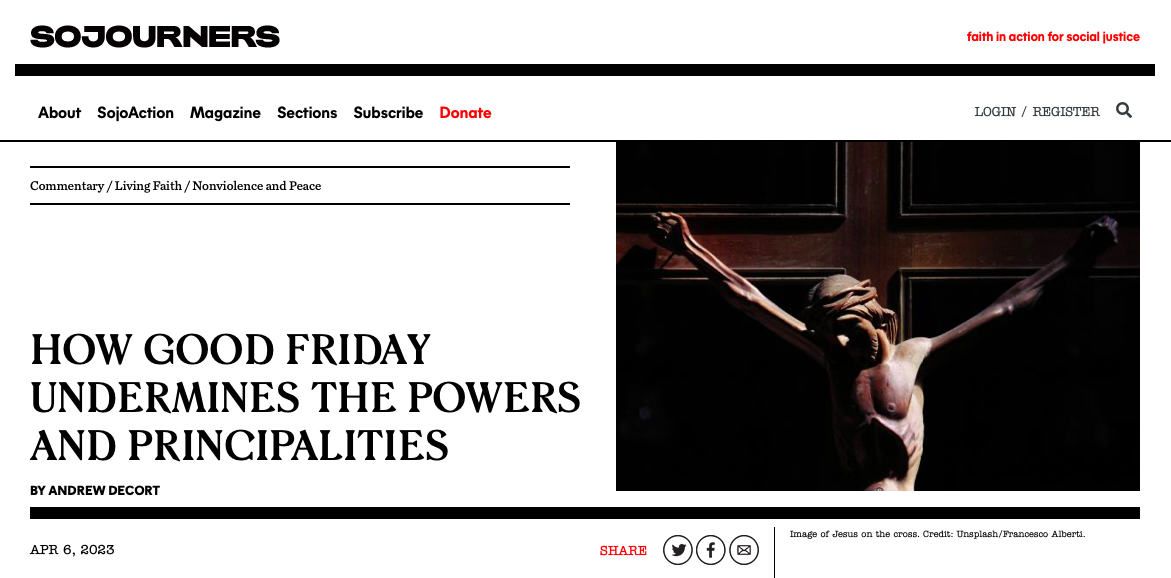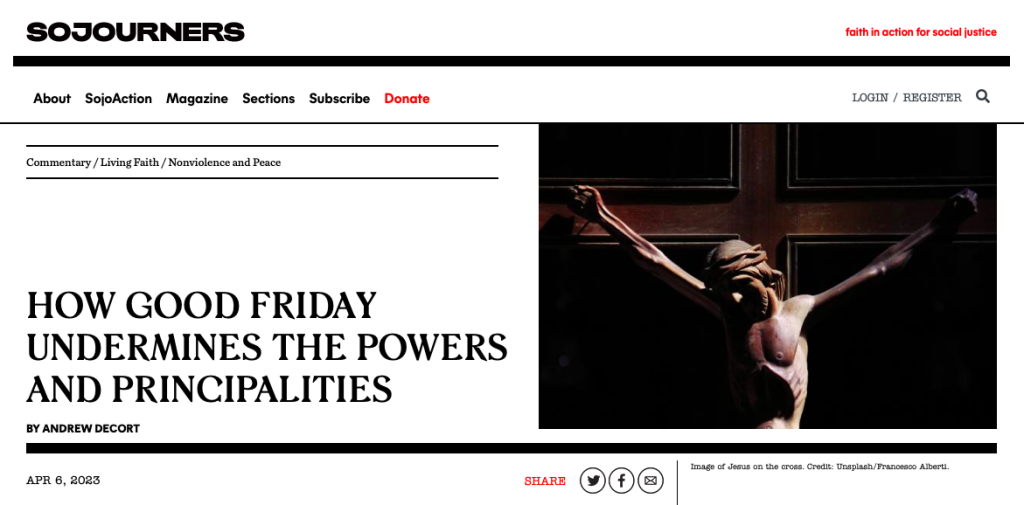Dear friends,
Happy Easter! Melkam Fasika! Jesus is alive, and death has been defeated with God’s resurrection power.
Celebrating Easter twice, both last week and today, is one of the joys of being married to Lily and sharing life with our beloved Ethiopian community. Today on Ethiopian Easter (Fasika), I pray for peace, healing, and hope in our communities.
Jesus’s death and resurrection isn’t just a once-a-year holiday; it’s the center of our daily lives as followers of Jesus. In this spirit, I’m delighted to share below my article with Sojourners entitled “How Good Friday Undermines the Powers and Principalities.” I write,
God is present in our seemingly God-forsaken places of failure, violence, and suffering. But God isn’t represented by those who condemn and kill; God is revealed in the crucified Jesus, who cries out with forgiveness, hope, and trust. Christians are invited to cry out with Jesus for our enemies in remembrance of Christ’s sacrifice (Romans 5:8).
On this topic, I’ll be speaking about “Loving Your Enemy” at Wheaton College on Thursday night at 7pm in Meyer 145 Buyse Lecture Hall. If you’re in Chicagoland, please come out and discuss this pillar of Jesus’s life with my friend Dr. Marc LiVecce and me. All of the details are in the flyer:

I hope to see you on Thursday night! May the Sojourners essay below energize your faith and practice of resurrection this week!
Yours with joy,
Andrew
“How Good Friday Undermines the Powers and Principalities” 
What is good about Good Friday? Why is the dark day commemorating Jesus’ murder still relevant for us as we ache with the grief of murderous violence, like the recent shooting at a Christian school in Nashville, Tenn.? From my perspective, contemporary identity is increasingly predicated on seeing others as “enemies,” and this vision fuels violence. In March, former president Donald Trump raged against his “enemies” at the annual Conservative Political Action Conference, declaring, “This is the final battle.”
Three years prior to Jesus’ crucifixion, he had launched a public movement in the violent society of the Roman Empire. He said that God’s kingdom was coming close, and he invited people to rethink their lives in light of it. His message revolved around a teaching that we desperately need to embrace today. That teaching, however, is also what led to his crucifixion.
Jesus clarified his vision in a public discourse that we call the “Sermon on the Mount.” In it, Jesus proclaimed that under God’s rule, the poor and the peacemakers would be blessed. But this is only half of Jesus’ most radical teaching. Jesus introduced an unprecedented imperative for human healing and conflict transformation that is needed now more than ever: “Love your enemies.” Jesus said this is how “your Father in heaven” loves, wanting good even for “the ungrateful and wicked” (Matthew 5:45; Luke 6:35).
Unsurprisingly, the politically powerful during Jesus’ time felt threatened by his embodied practice of enemy love. The way Jesus taught people to talk to God and to see others undermined both Rome and Israel’s claim of an exceptional status before God (today, Jesus’ teaching undermines the U.S.’s claim to exceptionality). Jesus’ emphasis on enemy love also critiqued structures of domination, like political violence, economic greed, religious authoritarianism, and indifference to the suffering of others. The command to love enemies like “our Father” shattered the worldview that God could ever be on an empire’s side; God condemns the pride of the violent and refuses to authorize the degradation or destruction of those we see as “unrelated” or “less than” ourselves (Matthew 20:16, 26).
Jesus’ vision of the kingdom undermined organizing society in hierarchical terms with some people being superior (“great”) and others being inferior (Matthew 20:16). Jesus called for a society of equal dignity and mutual service, so he defended women, welcomed foreigners, and praised ethnic minorities like the Samaritans. Jesus’ emphasis on enemy love subverted the vision of God’s presence being articulated in nationalistic terms.
It was Jesus’ subversive critique of these structures of domination — what the late theologian Walter Wink often referred to as “the powers and principalities” — that resulted in his being crucified. If Jesus were physically around today and saw how our society is organized around labeling others as enemies, incarcerating Black and brown children, banning books, and monopolizing resources, he would speak out against it and be nailed to the cross yet again. However, the kingdom that Jesus promotes is not simply about critiquing society but about constructing a society built around peace on earth (Matthew 6:10).
The reality that we are faced with is that in advocating for this peace, Jesus experienced the blood and anguish, rage and grief, cruelty and death that we remember on Good Friday: An innocent human being — indeed, the embodiment of God — is brutally murdered in the name of religious orthodoxy and national security. Once and for all, the murderous heart of oppressive power is unmasked and condemned: It promises life but mercilessly lynches even the Son of God.
Not only should we confront this darkness, but we can celebrate that this is where the radical goodness of Good Friday shines the brightest: Jesus embodies God’s absolute love for all of us, to the point of his own death. His execution, which was meant to crush and consume him, is converted into the revelation: God is present with the victims, nonviolently confronts the violent, and holds us in hope when human power does everything it can to erase hope.
As Jesus is crucified, he cries out to God for his killers, “Father, forgive them, for they don’t know what they’re doing” (Luke 23:34). He invokes the presence of the God who loves enemies and refuses to be derailed from his own practice of enemy love, even in the most devastating moment of his life.
Radical forgiveness for killers, defiant hope for the crucified, the witness that our suffering is held in God’s hands — this is the gospel message that Christians believe reveals God’s heart for humanity, and this is what we remember on Good Friday. Jesus’s promise of hope to the crucified invites us to reinterpret the apparent triumph of violence as a self-defeating evil that undoes itself and delivers us into God’s hands. It is a source of courage for all who struggle against evil. With his final words, Jesus promises this hope to the man being executed beside him — “Today you’ll be with me in paradise” — and claims it for himself, praying, “Father, into your hands I commend my spirit” (Luke 23:43, 46).
Good Friday, then, looks unflinchingly into the grotesque ugliness of violent human evil and the heartbroken anguish we unleash on one another, and it whispers that God’s goodness is stronger than this evil. God is present in our seemingly God-forsaken places of failure, violence, and suffering. But God isn’t represented by those who condemn and kill; God is revealed in the crucified Jesus, who cries out with forgiveness, hope, and trust. Christians are invited to cry out with Jesus for our enemies in remembrance of Christ’s sacrifice (Romans 5:8).
Jesus’ death embodies his original announcement of God’s kingdom and his imperative to love our enemies. Still today, Jesus invites us into this kingdom. God is near, even in the places we’re certain God is absent. The poor and peacemakers are blessed. God is our parent and loves even the ungrateful and wicked. And so, we are invited to rethink our lives in light of God’s rule. Goodness isn’t found in power, prestige, and the false promise of violence. That leads to the dead end of grief. Goodness is found in the prayerful practice of forgiveness, hope, and trust in God’s salvation, which was nailed to the cross.
This essay was originally published by Sojourners online on April 6, 2023. Special thanks to editor Josiah Daniels for inviting and improving my essay.
*** Explore Andrew DeCort, Flourishing on the Edge of Faith: Seven Practices for a New We (Washington, DC: BitterSweetBooks, 2022). Available at BitterSweetBooks, Audible, Kindle,Barnes & Noble, and all major booksellers.




